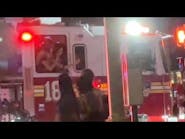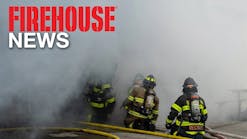Communication Issues Mire MA Firefighters' Contract Talks
By Ken Cleveland
Source Telegram & Gazette, Worcester, Mass.
CLINTON, MA—Union contact negotiations are commonly conducted behind closed doors, in executive sessions, often between attorneys, with a final document voted on in open session.
But not always.
The Clinton Firefighters Union took its issue with the town into the Board of Selectmen's meeting Wednesday night. The two sides agreed there were communication issues, but disagreed about where they were on the three-year contract that remains unsigned just months before it is due to expire.
"I'm very sorry I have to be here tonight. I shouldn't have to be," Fire Captain P.J. Chamberlain told selectmen. "All I'm looking for is an answer from (Town Administrator Michael Ward) trying to wrap up our contract."
"How about a response from your union attorney?" Selectmen Chairman Bill Connolly Jr. asked. "He has the information. Your counsel is trying to change the language. We're waiting to hear back."
"We still have questions unanswered," Chamberlain said. "All it's going to take is a simple email" from Ward or town counsel Robert Gibbons.
Gibbons said the attorneys communicate with each other. As the town's attorney, Gibbons said, he is not supposed to contact the client directly if they are represented by counsel.
The contract being discussed is to cover the years from 2017 to 2020, expiring June 30, 2020, meaning the contract will expire possibly a few months after being signed. The past two contracts have been similar - final contracts being signed in the final year covered by the pacts.
Clarifying the situation after the meeting, Ward said, "The parties settled these negotiations with a Memorandum of Agreement in 2017 and Town Meeting funded the wage increases." He said the terms of the MOA have been honored.
"The whole issue is the drug testing language in the contract," Selectman Michael Dziokonski said. "We accepted the fire union language."
"It was a union contract, then the union counsel wanted to change its own language," Connolly said.
"The town and fire union had agreed to language on drug testing, which was basically union language," Dziokonski said. He added there was then a change in union leadership and lawyers. "Then the language was not good enough."
"It was a request," Chamberlain said of the latest revisions, "since it hadn't been finished.
"If not, OK, we concede. We're looking to end this," Chamberlain said.
"Your counsel has not conceded," Gibbons said. "You need answers from your own counsel. The breakdown in communication is between the union and its own counsel."
Responding to The Item after the meeting, Chamberlain said, "The only 'loose end' that needed to be agreed upon was the integration of a drug policy. The Clinton Firefighters had proposed a drug policy two times in past negotiations, only to have the town shoot the proposal down. When the town proposed a drug policy during this current contract, we obviously were not and are still not opposed.
"We agreed to a drug policy 'in principle.' We needed to finally see language to completely agree to it. The Clinton Firefighters waited over two years after the agreement to receive such language, a year of which went by with unanswered emails checking in on the status," Chamberlain said. In October, he requested help from selectmen to persuade town counsel to produce the drug language, which he said he got "due to the efforts of Chairman Connolly and Solicitor Gibbons."
The firefighters have been operating under a MOA spelling out terms of the contract, but wording discussions have lingered.
"My question is, if that was set in stone, why did we have to wait two years?" Chamberlain asked selectmen.
Gibbons said the contract was put together and set two months ago when Chamberlain had come in. At that time, Chamberlain had sought a copy of the contract, complaining about delays in getting an updated copy of the document.
"The issue under discussion is integration of language for the agreed upon terms into the full contract document, expressly a provision for drug testing," Ward said after the meeting. The drug testing language was approved by selectmen with all modifications made by union counsel. "Leadership of the union changed shortly thereafter and recently, when the contract document was being finalized for signatures, there was an inquiry from the union about further modification of this drug testing language that the town felt was already accepted and settled."
Chamberlain told selectmen the union was ready for the final document.
"If you want to reopen negotiations, do it through counsel," Connolly said.
"We have no intention of reneging on this deal," Chamberlain said. He said the attorney had seen the question, but apparently, "he didn't realize it was a done deal."
At the meeting, the discussion was largely about communication issues, not the substance of the wording.
"The breakdown in communication is between the union and its own attorney," Connolly said.
"I'll get on the phone with the attorney and hopefully get a response tomorrow," Chamberlain said.
He later provided an email response from the union attorney, Patrick Bryant of Pyle Rome, to the town counsel, Nicholas Anastasopoulos of Mirick O'Connell, an associate of Gibbons', emailed approximately the time the board's meeting ended Wednesday night.
In the email, Bryant said he had reached out multiple times to counsel to explore amendments to the drug testing language. He also referred to a request to start negotiations for the next contract.
———
©2020 Telegram & Gazette, Worcester, Mass.
Visit Telegram & Gazette, Worcester, Mass. at www.telegram.com
Distributed by Tribune Content Agency, LLC.






